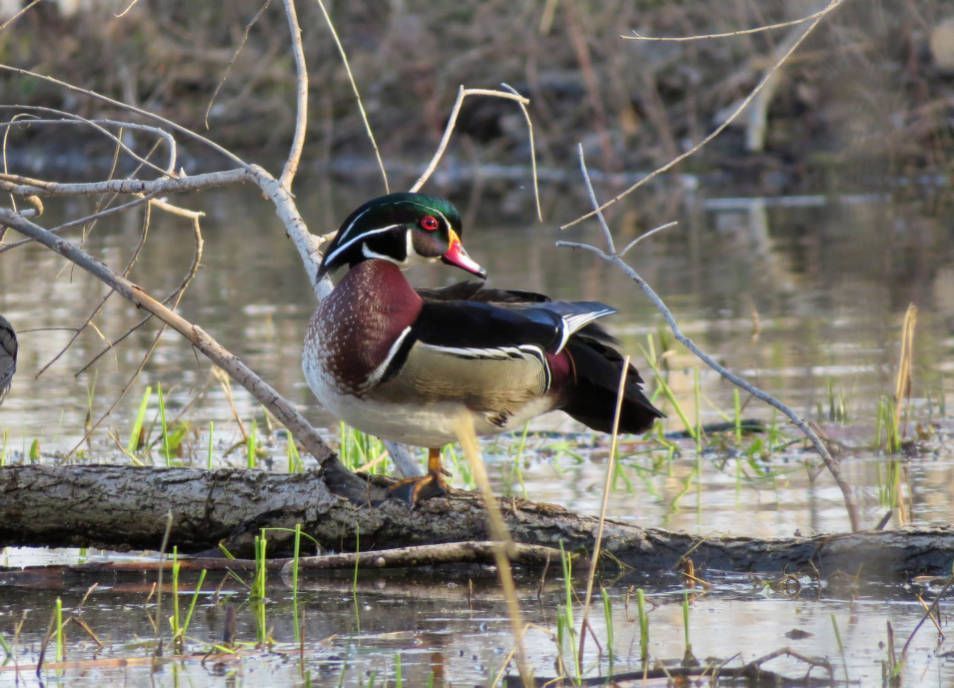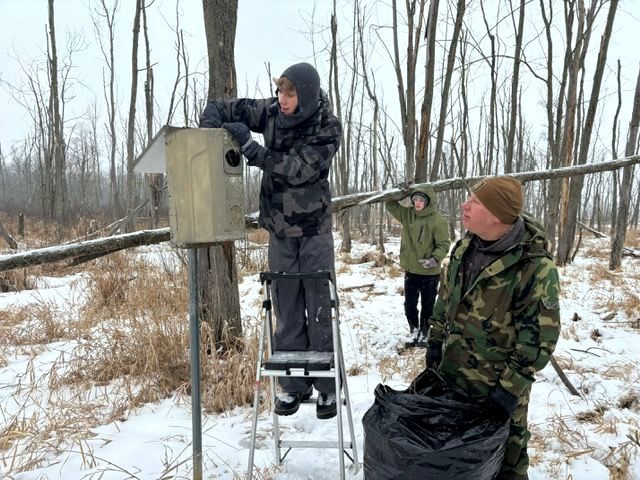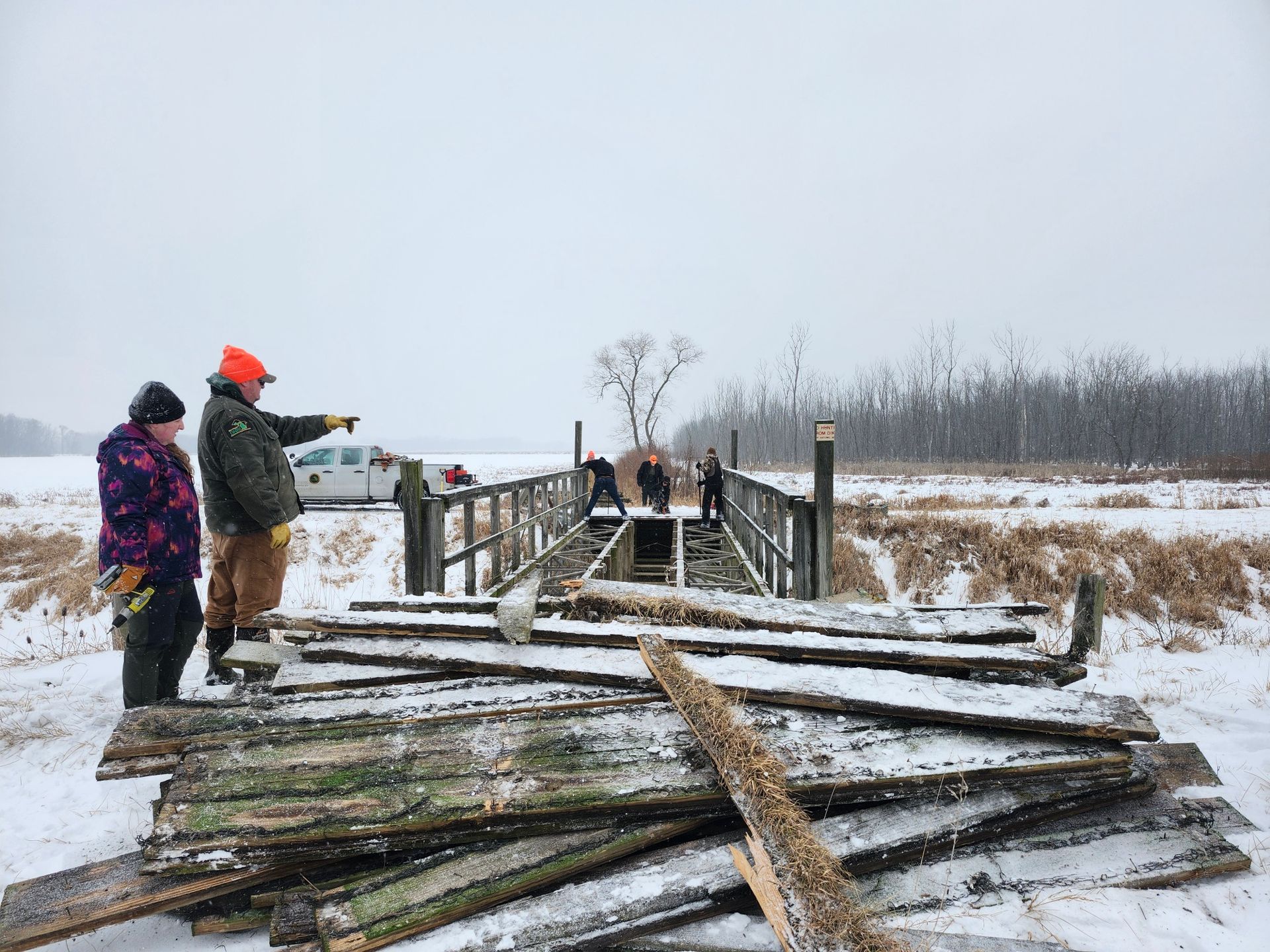On the Ground: Wood Duck Boxes & More at Maple River State Game Area
On Saturday, February 15, 2025, 26 volunteers joined MUCC’s On the Ground program in partnership with the Michigan Department of Natural Resources (DNR) for a wood duck nest box event at Maple River State Game Area in Gratiot County. This area located just north of Lansing consists of farm fields, woodlands, grasslands, and cattail marshes. It is a popular destination for hunters, trappers, birders, and wildlife viewers alike.
Volunteers Maintain Nest Boxes & Remove Decking
During this project, volunteers worked within three separate units of the state game area. Each group checked nest boxes and replaced old nesting material with fresh material as needed. Any use of the nest boxes by either wood ducks or other wildlife was also noted onto a data sheet. One group of volunteers also installed two brand new boxes in an area adjacent to several ponds. These new boxes will help increase nesting success even further for this incredible species. They will continue to be monitored by the DNR in addition to the existing boxes. Additionally, brush covering the entry of the boxes was cleared and used to create brush piles for small game habitat.
Another group of volunteers removed old decking from a cross-bridge located between two units. Removal was fairly easy given that the boards were old and rotting away, which made the project all the more important. The boards will be replaced with fresh wood later in the year, therefore improving hunter accessibility. In total, volunteers improved approximately 49 acres of wildlife habitat directly through this project.
Why Is It Important?
Maintaining nest boxes for wood ducks is important to ensure this species is around for many years to come. Wood ducks are beloved birds and very popular among waterfowl hunters and birders alike. Males have a green and iridescent head with a chestnut-colored chest and other striking markings, and females are a grayish brown with white teardrops around their eyes (Cornell University Lab of Ornithology). According to the Michigan Department of Natural Resources (DNR), wood ducks are second only to mallards in being the most common species harvested during waterfowl season in Michigan.
Wood ducks are cavity-nesting birds, meaning they build their nests inside sheltered areas like tree cavities. They typically nest in places where a branch has broken off and the wood has subsequently rotted, creating a hole inside of the tree (Cornell University Lab of Ornithology). When suitable nesting cavities become scarce, artificial nest boxes are a great alternative. According to the U.S. Fish and Wildlife Service, wood ducks were almost pushed to extinction along with other commonly hunted birds in the early 1900s due to overhunting and habitat loss. Regulations during this time were very minimal, which allowed hunters to harvest wood ducks faster than they could reproduce. Biologists began building and installing artificial nest boxes in the 1930s as a way to help boost populations. Additionally, regulations like the Migratory Bird Treaty Act were created to improve protections for migratory bird species including wood ducks. As a result, wood duck populations rebounded and as many as 3 million breeding pairs exist across North America today (U.S. Fish and Wildlife Service).

Learn More
Want to stay up to date on our upcoming events? Visit mucc.org/on-the-ground for more information on future projects. We work to conserve and enhance Michigan’s public lands and wildlife through volunteer stewardship projects. Some of our events include invasive species removal, wood duck boxes, river cleanups, tree plantings, and more. We welcome all ages, so bring a friend or two if you’d like! All registered volunteers receive lunch and a free appreciation gift for their efforts.
To stay connected with all things MUCC, follow us on Facebook, Instagram, X, and LinkedIn.
Recent Posts





